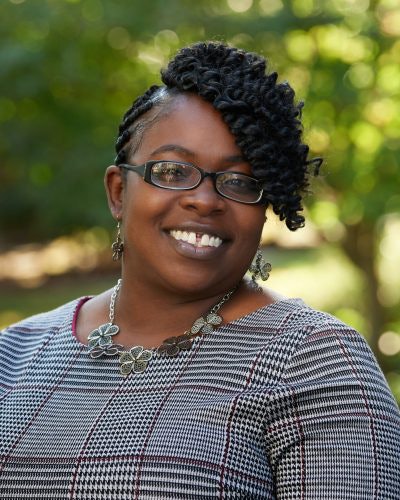Keena Williams is no stranger to Albion College.
Williams graduated from the private Michigan college in 2009 and took on various positions at the school before she was recently tapped to serve as the college’s new chief belonging officer and Title IX coordinator.
 Keena Williams
Keena WilliamsAs chief belonging officer, Williams will serve in Dr. Mathew Johnson’s presidential cabinet. She’s been tasked with the responsibility of not only promoting diversity, equity and inclusion efforts but helping all students, staff and faculty feel comfortable on campus.
“And so, my role is to hold people accountable for the role that they play in diversity, equity, inclusion (DEI) work and, ultimately, belonging for our faculty, staff and students,” Williams said.
Albion’s student population has transformed over the last five years, dramatically rising from 15% students of color to more than 42% students of color. This academic year’s freshman class included 56% students of color, said Johnson.
“As numbers grew and I came on board, it became clear to me that that approach was not sufficient for the work that needed to be done for students to feel like they belong here at the college,” Johnson said. “For us, belonging is the goal. It is beyond diversity, inclusion and equity. And so we need an office that is sufficiently empowered to push the institution to make the institutional-level changes that we need to make so that everyone feels like they belong here at Albion.”
For Albion, belonging includes dealing with issues of sexism and Title IX issues, Johnson said.
“We know that Title IX is a consequence of institutional sexism that was built into higher education and is built into many institutions across our society,” Johnson said. “So belonging is not just about what we think of classically in diversity terms around race and ethnicity. Belonging is about gender. It’s about sexual orientation. It’s about disability rights. It’s about any “ism” that disadvantages one person over the others [and] is a problem.”
Johnson said that research showed students who feel that they don’t belong suffered “extra cognitive load.”
“Their brain is forced to do extra work over the people who feel like they belong,” Johnson said. “So, if we remove microaggressions, if we remove the artifacts of earlier ages of sexism and racism, if we remove and work to have everyone feel like they belong, then everyone gets equal access to academic success.”
 Dr. Mathew B. Johnson
Dr. Mathew B. JohnsonThe study of belonging isn’t new. Experts such as Dr. Terrell L. Strayhorn at Virginia Union University and others have written extensively about the subject. But hiring someone with the title of a belonging officer is relatively new.
The work has been a “fun challenge,” Williams said about her new role, which required setting up an entirely new office on campus.
Her short-term goal is to successfully launch Albion’s Blueprints for Belonging, or action plans that campus units – departments, divisions, programs and some student organizations – have to submit on how they plan to address belonging efforts for their respective areas.
“Our Blueprint for Belonging is our opportunity to hold all of the units of the college accountable for how they are addressing belonging on our campus [as well as] diversity, equity and inclusion on our campus,” Williams said. “Each year, they will have to submit a report on how they did and then submit a new plan for the next year.
“It’ll be an ongoing process for us. And this really does shift the way in which we think about belonging, diversity, equity and inclusion work on our campus.”
And that is just one of her plans.
“There’s a number of things that we’re putting in place to begin to shift the culture of our institution, the way we think about it, the way we address concerns, the way we write policies, what policies need to be written, what policies need to be changed,” Williams said. “So again, the work is vast. It just feels vast.”
Arrman Kyaw can be reached at akyaw@diverseeducation.com
















